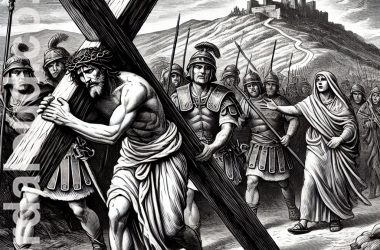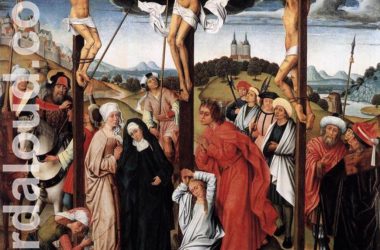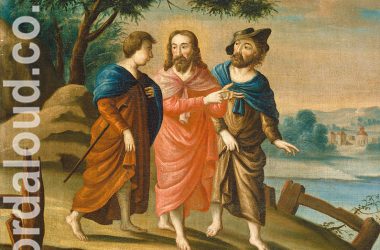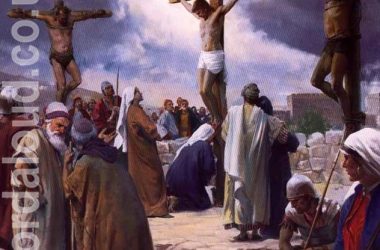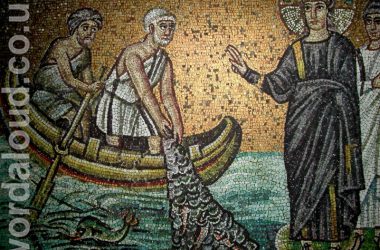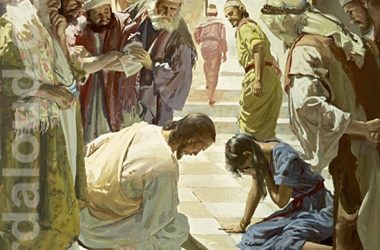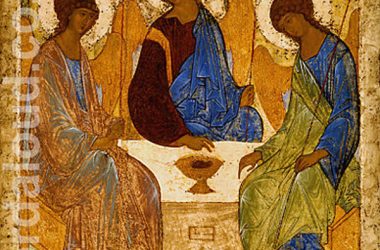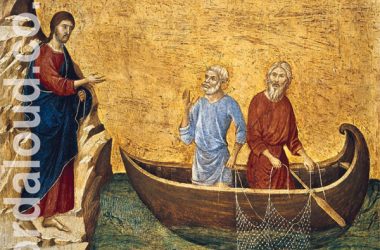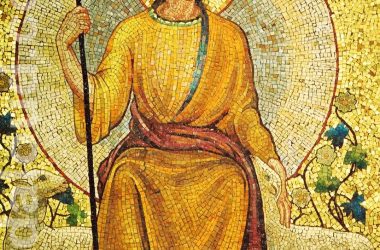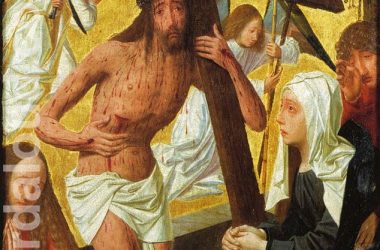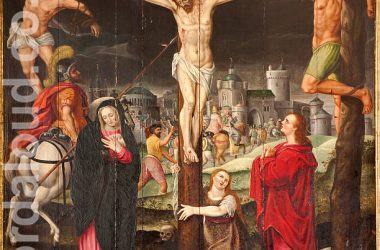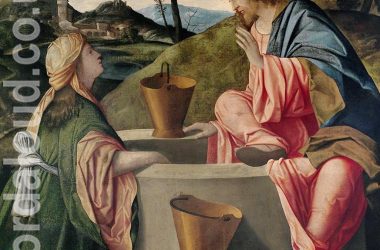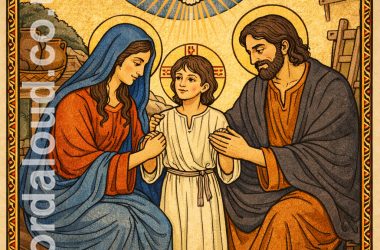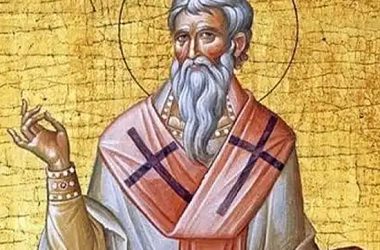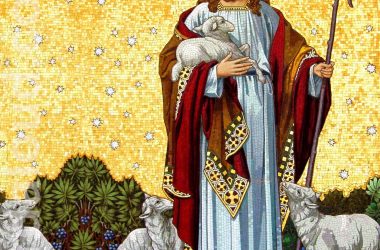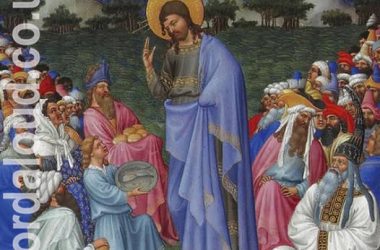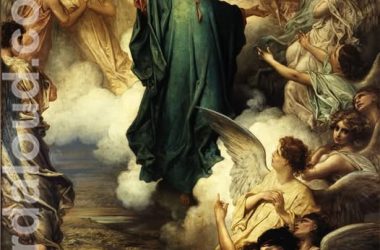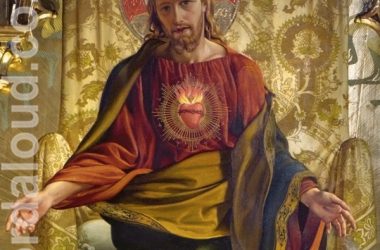In this reading, Saint Bonaventure sets out a theological vision of Scripture that is centred on Christ and grounded in faith. He insists that the understanding of sacred Scripture does not begin with human study alone, but with divine revelation and the interior work of God [ … ]
Office Of Readings | Week 5, Sunday, Ordinary Time | A Reading From Saint Augustine’s Explanation Of Saint Paul’s Letter To The Galatians | The Need To Understand The Power Of God’s Grace
In this reading, Saint Augustine explains the situation that prompted Saint Paul’s letter to the Galatians and clarifies its central theological concern: the nature of God’s grace and the freedom it brings. Augustine reads the letter as a defence of the Gospel against a misunderstanding that threatened to obscure its core message [ … ]
Office Of Readings | Week 4, Saturday, Ordinary Time | A Reading From The Pastoral Constitution On The Church In The Modern World Of The Second Vatican Council | The Regulation Of Human Activity
This reading from the Pastoral Constitution on the Church in the Modern World reflects on human activity, especially work and social engagement, and places it within a clear theological framework. The Council seeks to affirm the value of human action while clarifying its proper orientation and limits [ … ]
Office Of Readings | Week 4, Friday, Ordinary Time | A Reading From The Homilies Of A Fourth-Century Spiritual Writer | May You Be Filled With All The Fulness Of Jesus Christ
This homily from a fourth-century spiritual writer reflects on the varied ways in which the Holy Spirit works within those who have been reborn in Jesus Christ. Rather than describing a single spiritual pattern, the text presents Christian life as dynamic, marked by change, growth, and responsiveness to grace [ … ]
Office Of Readings | Week 4, Thursday, Ordinary Time | A Reading From The Catecheses By Saint Cyril Of Jerusalem | Let The Cross Be A Joy To You Even In Times Of Persecution
In this catechetical instruction, Saint Cyril of Jerusalem places the cross at the centre of Christian faith and identity. His purpose is to form believers who not only understand the meaning of Christ’s death but are prepared to confess it publicly, even under pressure [ … ]
Office Of Readings | Week 4, Wednesday, Ordinary Time | A Reading From The Treatise On Spiritual Perfection By Diadochus Of Photice | The Art Of Discernment Of Spirits Is Acquired By A Spiritual Taste
In this reading from On Spiritual Perfection, Diadochus of Photiké reflects on discernment, presenting it as a spiritual capacity formed by stillness, grace, and love. The mind, he argues, has a spiritual sense that enables it to distinguish reliably between good and evil when it is illuminated by true knowledge [ … ]
Office Of Readings | Week 4, Tuesday, Ordinary Time | A Reading From The Treatise Of Saint Irenaeus Against The Heresies | The First Fruits Of Resurrection In Christ
In this reading from Against the Heresies, Saint Irenaeus sets out a compact and carefully reasoned account of the Incarnation and its saving purpose. His focus is on the unity between Christ and humanity, and on the resurrection as the fulfilment of that unity [ … ]
Office Of Readings | Week 4, Monday, Ordinary Time | A Reading From The Discourse Of Saint Hilary Of Poitiers On The Psalms | The Company Of Those Who Believed Were Of One Heart And Soul
In this reading from his commentary on the Psalms, Saint Hilary of Poitiers reflects on the meaning of unity within the Church, drawing from Psalm 133 (Vg. 132) and from the life of the early Christian community. Unity is presented not as uniformity, but as a shared purpose rooted in faith and love [ … ]
Office Of Readings | Week 4, Sunday, Ordinary Time | A Reading From Saint Ignatius Of Antioch’s Letter To The Church Of Smyrna | Jesus Christ Has Called Us To His Kingdom And Glory
In this reading from his letter to the Church of Smyrna, Saint Ignatius of Antioch sets out a clear and careful confession of faith in Jesus Christ. Writing as a bishop on his way to martyrdom, he addresses a community he knows to be firm in faith and love, and he seeks to strengthen them in the truth of Christ’s person and saving work [ … ]
Office Of Readings | Week 3, Saturday, Ordinary Time | A Reading From The Pastoral Constitution On The Church In The Modern World Of The Second Vatican Council | The Mystery Of Death
This reading from the Pastoral Constitution on the Church in the Modern World addresses the human concern with the subject of death. It approaches the subject not only as a biological event but as a spiritual and existential mystery that touches the deepest questions about meaning, identity, and destiny [ … ]
Office Of Readings | Week 3, Friday, Ordinary Time | A Reading From The Commentary Of Saint John Fisher On The Psalms | God’s Wonderful Deeds
In his commentary on the Psalms, Saint John Fisher reflects on the pattern of God’s saving action in history and the human response to it. He moves from the story of Israel to the life of the Church, showing a continuity of divine generosity and a repeated failure of gratitude [ … ]
Office Of Readings | Week 3, Thursday, Ordinary Time | A Reading From The Sermons Of Bishop John Of Naples | Love The Lord And Walk In His Ways
In this reading, John the Serene reflects on Christ as light and on the change that this light brings to human life. Taking his starting point from the psalm, ‘The Lord is my light and my salvation; whom shall I fear?’ he explores what it means to live in the illumination given by God [ … ]
Office Of Readings | Week 3, Wednesday, Ordinary Time | A Reading From The Sermons Of Saint Bernard On The Song Of Songs | Where Sin Abounded, Grace Superabounded
In this reading concerning The Song of Songs, Saint Bernard of Clairvaux explores the relationship between human weakness and the mercy of Christ. His language is personal and contemplative, yet it expresses a clear theological conviction: the wounds of Christ are the place where fear, guilt, and insecurity are overcome [ … ]
Office Of Readings | Week 3, Tuesday, Ordinary Time | A Reading From The Longer Rules For Monks By Saint Basil The Great | How Shall We Repay The Lord For All His Goodness To Us?
In this reading from the Detailed Rules for Monks, Saint Basil the Great reflects on the scale of God’s generosity and the only response that can meet it. Although written for a monastic audience, his argument addresses the basic shape of Christian gratitude and love [ … ]
Office Of Readings | Week 3, Monday, Ordinary Time | A Reading From The Constitution On The Church In The Modern World Of The Second Vatican Council | The Sanctity Of Marriage And The Family
This reading from the Constitution on the Church in the Modern World presents marriage and family life as a central setting for Christian holiness. The reading describes marriage not simply as a social arrangement, but as a covenant rooted in personal union, fidelity, and participation in God’s own love [ … ]
Office Of Readings | Week 3, Sunday, Ordinary Time | A Reading From The Constitution On The Sacred Liturgy Of The Second Vatican Council | Christ Is Present In His Church
This reading from the Constitution on the Sacred Liturgy of the Second Vatican Council sets out a comprehensive understanding of the liturgy as the privileged place of Christ’s presence and action in the Church. Rather than treating worship as one activity among others, the text presents the liturgy as central to the Church’s life and mission [ … ]
Office Of Readings | Week 2, Saturday, Ordinary Time | A Reading From The Treatise Of Saint Irenaeus Against The Heresies | The Pure Oblation Of The Church
In this reading from Against Heresies, Saint Irenaeus of Lyons explains the meaning of Christian offering and its place within God’s saving plan. Writing in response to teachings that misunderstood creation, sacrifice, and the body, he presents the Church’s oblation as both faithful to God’s purpose and rooted in gratitude for creation [ … ]
Office Of Readings | Week 2, Friday, Ordinary Time | A Reading From The Treatise By Diadochus Of Photike On Perfection | God Alone Should Be Loved
In this reading from On Spiritual Perfection, Diadochus of Photiké reflects on the relationship between love of God and love of self. His argument is clear and direct: self-love and love of God move in opposite directions. To love God truly requires a turning away from concern for one’s own glory and a complete reorientation towards the glory of the Creator [ … ]
Office Of Readings | Week 2, Thursday, Ordinary Time | A Reading From The Letters Of Saint Fulgentius Of Ruspe | Christ Lives For Ever To Make Intercession For Us
In this reading, Saint Fulgentius of Ruspe reflects on the meaning of Christian prayer and its foundation in the priestly work of Christ. His focus is on why the Church consistently prays to the Father through Jesus Christ, and how this practice expresses central truths about the Incarnation and the Trinity [ … ]
Office Of Readings | Week 2, Wednesday, Ordinary Time | A Reading From The Dogmatic Constitution On The Church Of The Second Vatican Council | Behold! I Will Save My People
This reading from the Dogmatic Constitution on the Church of the Second Vatican Council sets out a broad vision of God’s plan of salvation and the place of the Church within it. Drawing on Scripture and the tradition of the Church, it presents salvation history as a continuous and purposeful work of God, rooted in creation and directed towards fulfilment at the end of time [ … ]
Office Of Readings | Week 2, Tuesday, Ordinary Time | A Reading From The Letter Of Pope Saint Clement I To The Corinthians | Who Can Describe The Constraining Power Of The Love Of God?
In this reading from his letter to the Corinthians, Pope Saint Clement I of Rome reflects on the central place of love in the Christian life. Writing to a divided community, Clement presents love as the force that binds believers together and restores harmony. His words combine practical instruction with meditation on the example of Christ [ … ]
Office Of Readings | Week 2, Monday, Ordinary Time | A Reading From The Letter Of Saint Ignatius Of Antioch To The Ephesians | Have Faith And Love For Jesus Christ
In this reading from his letter to the Ephesians, Saint Ignatius of Antioch continues his instruction on the Christian life, concentrating on faith, love, and the power of common worship. Writing to a community he knows well, Ignatius encourages regular gathering for prayer and thanksgiving, seeing this as a central defence against spiritual danger [ … ]
Office Of Readings | Week 2, Sunday, Ordinary Time | A Reading From The Letter Of Saint Ignatius Of Antioch To The Ephesians | The Harmony Of Unity
In this reading from his letter to the Ephesians, Saint Ignatius of Antioch reflects on the importance of unity within the Christian community. Writing as a prisoner on his way to martyrdom, Ignatius speaks with humility and urgency. He does not present himself as a figure of authority, but as a fellow disciple who is still learning what it means to follow Christ [ … ]
Office Of Readings | Week 1, Saturday, Ordinary Time | A Reading From The Letter Of Pope Saint Clement I To The Corinthians | By Faith God Has Justified All Men From The Beginning Of Time
This reading from the letter of Pope Saint Clement I to the Corinthians sets out an early Christian understanding of faith, justification, and good works. Clement addresses a community facing tension and division, and he appeals to shared scriptural history as a way of restoring unity and purpose. His argument develops in careful stages, moving from examples drawn from the Old Testament to practical conclusions for the present life of believers [ … ]
Office Of Readings | Week 1, Friday, Ordinary Time | A Reading From The Discourse Of Saint Athanasius Against The Gentiles | Through The Word A Truly Divine Harmony Is Reached In All Things
Saint Athanasius invites us to see creation not as a collection of disconnected parts, but as a single, living harmony held together by the Word of God. He begins with the words of Saint John’s Gospel: All things were made through him. This is the foundation of Christian faith about the world. Nothing exists by chance; everything exists because the Word – the Son of God – calls it into being and sustains it [ … ]
Office Of Readings | Week 1, Thursday, Ordinary Time | A Reading From The Discourse Of Saint Athanasius Against The Gentiles | The Word Of The Father Orders And Contains The Universe
In this passage from Against the Pagans, Saint Athanasius presents a carefully ordered vision of creation governed by the Word of God. His concern is not only to defend Christian belief against pagan thought, but to show that the structure and coherence of the world itself point to the Word as its source and sustainer [ … ]
Office Of Readings | Week 1, Wednesday, Ordinary Time | A Reading From The Treatise Of Saint Iranaeus Against The Heresies | Knowledge Of The Father Is The Manifestation Of The Son
In this reading from Against the Heresies, Saint Irenaeus sets out a central conviction of early Christian theology: knowledge of God the Father is possible only through the Son, the Word of God. This is not a matter of intellectual effort or philosophical ascent, but of divine self-disclosure [ … ]
Office Of Readings | Week 1, Tuesday, Ordinary Time | A Reading From The Longer Rules Of Saint Basil The Great | We Possess An Inborn Power Of Loving
In this reading from the Longer Rules for Monks, Saint Basil the Great reflects on the origin of love for God and its place in the moral life. Basil’s starting point is significant: love of God is not presented as something imposed from outside or learned through instruction alone. Instead, Basil argues that the capacity to love God is already present within human nature [ … ]
Office Of Readings | Week 1, Monday, Ordinary Time | A Reading From The Letter Of Pope Saint Clement I To The Corinthians | The Word Of God Is The Found Of Wisdom On High
This prayerful reading of Pope Saint Clement I, one of the earliest bishops of Rome, shows how firmly the first Christian communities understood their life to be grounded in God’s initiative rather than human achievement. Clement addresses God as Creator and Sustainer of all things, and places the Church entirely within God’s ordering of the world [ … ]
Office Of Readings | The Baptism Of The Lord Jesus Christ | A Reading From The Orations Of Saint Gregory Nazianzen | The Baptism Of Jesus Christ
Saint Gregory Nazianzen presents the baptism of Christ as an event that concerns not only Jesus Christ himself but the whole renewal of creation. From the opening lines, Saint Gregory draws the reader into participation: what happens to Jesus Christ is meant to happen to us all. Christ enters the water, and humanity is invited to enter with him; Christ rises, and humanity is raised with Jesus Christ [ … ]
Office Of Readings | 10th January | A Reading From The Commentary Of Saint Cyril Of Alexandria On Saint John’s Gospel | The Outpouring Of The Holy Spirit On All Flesh
Saint Cyril of Alexandria considers how the Holy Spirit is given to humanity through Christ. Saint Cyril’s central point is that the renewal of human nature is inseparable from the gift of the Spirit. Without the Spirit, humanity cannot return to the peace and stability intended by God from the beginning.[ … ]
Office Of Readings | 9th January | A Reading From The Orations Of Saint Proclus Of Constantinople | The Sanctifying Of The Waters
In this reading, Saint Proclus reflects on the feast of the Epiphany as a revelation that completes and deepens the mystery of Christmas. At Christmas, Jesus Christ is revealed in weakness, as an infant sharing fully in human vulnerability. At Epiphany, and especially in the baptism in the Jordan, Jesus Christ is revealed in his public mission and divine authority. The same Lord who lay in a manger now stands in the waters, sanctifying creation itself [ … ]
Office Of Readings | 8th January | A Reading From The Discourse On The Holy Theophany Attributed To Saint Hippolytus | Water And The Spirit | Theophany
The reading reflects on the baptism of Christ as a moment of revelation and renewal. The author begins by stressing the paradox of the event: Christ, who is the source of life, enters the waters of the Jordan. The language highlights the contrast between Christ’s divine identity and the humility of his action. The one who sustains creation submits freely to baptism, not out of need, but in obedience to the Father’s will [ … ]
Office Of Readings | 7th January Or Monday After Epiphany | A Reading From The Sermons Of Saint Peter Chrysologus | In Choosing To Be Born For Us, God Chose To Be Known By Us
Saint Peter Chrysologus reflects on the Incarnation as God’s deliberate choice to make himself known in a way human beings can receive. Although Christ’s divine nature was always present, it is disclosed through concrete events that speak to human senses and understanding. God does not remain hidden in abstraction, but enters history so that knowledge of him may be grounded in what can be seen, heard, and encountered [ … ]
Office Of Readings | Epiphany | 6th January | A Reading From A Sermon By Pope Saint Leo The Great | The Lord Has Made His Salvation Known To The Whole World
Pope Saint Leo the Great interprets the manifestation of Christ to the nations as the fulfilment of God’s long-standing purpose for the whole world. Salvation is not presented as an afterthought or a change of plan, but as the completion of a design already set in motion in the promises made to Abraham. From the beginning, God’s intention was that the blessing given to Abraham should extend beyond ethnic descent to all who share his faith [ … ]
Office Of Readings | Christmastide | 5th January | A Reading From A Sermon By Saint Augustine | Our Desires Will Be Completed, Fulfilled, In The Vision Of The Word
Saint Augustine reflects on the contrast between the hidden riches of Christ and the visible poverty of his humanity. What appears small and limited in Christ’s earthly life conceals the fullness of divine wisdom and knowledge. Augustine draws on the language of scripture to show that Christ’s poverty is not a loss but a means: through it, humanity is brought to a greater inheritance [ … ]
Office Of Readings | Christmastide | 4th January | A Reading From The Five Centuries Of Saint Maximus The Confessor | The Mystery Ever New
Saint Maximus the Confessor reflects on the incarnation as a mystery that is complete in itself and yet continually active in the life of the believer. Christ was born once in the flesh, in history, but he is also born spiritually in those who desire him. This second birth does not add to Christ, nor does it repeat the incarnation. Rather, it describes how the life of Christ takes shape in the believer through faith and virtue [ … ]
Office Of Readings | Christmastide | 3rd January | A Reading From Saint Augustine’s Treatises On Saint John | The Twin Commandments Of Love
In this reading, Saint Augustine reflects on the two commandments on which, according to Christ, the whole of the Law and the prophets depend: love of God and love of neighbour. Augustine presents Christ as the teacher who brings these commandments into focus and shows their central place in the Christian life [ … ]

